|
|
|
Sort Order |
|
|
|
Items / Page
|
|
|
|
|
|
|
| Srl | Item |
| 1 |
ID:
191468
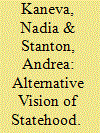

|
|
|
|
|
| Summary/Abstract |
This study contributes to efforts to theorize contemporary challenges to the nation-state as a normative governance unit through an analysis of Islamic State’s state ideology. It is argued that, by reinterpreting concepts from Islamic history, IS puts forth a religiously motivated, post-national state ideology. Based on an interdisciplinary reading of Dabiq magazine, the de facto official IS publication between 2014 and 2016, three concepts emerge as foundational in the group’s state ideology: imamah (leadership), hijrah (migration), and bay‘a (allegiance). The study sheds light on the enduring ideology of Islamic State, despite its territorial defeat.
|
|
|
|
|
|
|
|
|
|
|
|
|
|
|
|
| 2 |
ID:
161095
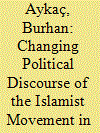

|
|
|
|
|
| Summary/Abstract |
This article deals with the Islamist movement and its ideology throughout the process of modernization and analyzes the political discourse of the Islamists about a world of consumption and the Islamic lifestyle. The article depicts the course of the Islamist political discourse from the beginning. The political discourse of the Islamists showed variations depending on the changing domestic and foreign conjunctions. Developed through a defensive understanding in the final period of the Ottoman State, the discourse of the Islamist movement underwent further changes in the following periods, which was influenced by the internal conditions of the country and developments outside. As the Islamist movement has always adapted to modern political life, political and intellectual changes in the modern period caused the Islamist discourse to change politically and acquire an appropriate language for the new situation.
|
|
|
|
|
|
|
|
|
|
|
|
|
|
|
|
| 3 |
ID:
073659
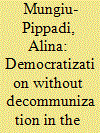

|
|
|
|
|
| Publication |
2006.
|
| Summary/Abstract |
Since recent U.S.-led democratization projects having led in some cases to the election of Islamist movements, the old democratic theory that structural preconditions are key determinants of successful democratization has apparently been bolstered. This article examines the democratization experience in postcommunist Europe to assess which matters more, a society's "givens" favoring democracy or the institutional imports that a democracy-minded elite can borrow. In particular, it compares the experience of the Southeast Europe countries, which presented poor prerequisites for successful democratization and yet in at least two cases (Romania and Bulgaria) are far along on the path to democratization to the experience of Central Europe and the former Soviet Union as a whole.
|
|
|
|
|
|
|
|
|
|
|
|
|
|
|
|
| 4 |
ID:
153012
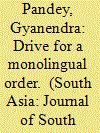

|
|
|
|
|
| Summary/Abstract |
This paper explores the changing contours of politics and democracy in our times by examining the ways in which populations and privileges are increasingly being distributed in cities and countries across the globe. In the light of these changing demographic and social conditions, it asks what are the appropriate terms for analysis of such population groups and their political aspirations, and suggests that we are working with outmoded analytical frames, concepts and languages that belong to another time. It goes on to a brief examination of the kinds of fault-lines that remain and that allow for a range of political initiatives and possibilities.
|
|
|
|
|
|
|
|
|
|
|
|
|
|
|
|
| 5 |
ID:
086753
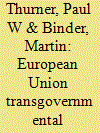

|
|
|
|
|
| Publication |
2009.
|
| Summary/Abstract |
Does the European Union (EU) represent a new political order replacing the old nation-states? The assessment of the real character of political orders requires the identification of political key actors and of the specific structure of their interactions. Transgovernmental networks have been considered to be one of the most important features of EU integration. Unfortunately, the network structures, processes and the impact of these informal horizontal inter-organisational relations between nation-states are mostly unknown. The main objective of this article is to measure and explain the selective pattern of informal bilateral relations of high officials of the EU Member States' ministerial bureaucracies on the occasion of an EU Intergovernmental Conference. The quantitative data used rely on standardised interviews with 140 top-level bureaucrats. The statistical estimation of network choices is based on recent developments of exponential random graph models.
|
|
|
|
|
|
|
|
|
|
|
|
|
|
|
|
| 6 |
ID:
160841
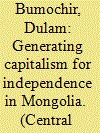

|
|
|
|
|
| Summary/Abstract |
Following Laura Bear et al.’s discussion of ‘generating capitalism’, this article presents an account of two historical periods in which certain Mongolian rulers made the deliberate decision to embrace Euro-American capitalism. They explain that this was done to help Mongolia entice ‘third neighbours’ whose interests secure Mongolia’s independence by preventing Mongolia from being occupied by China or Russia. This paper then recounts how, during each of these historical periods, the nation-state’s rulers prioritized the declaration and consolidation of de facto constitutive political independence. Building on this prioritization of the political, this paper argues that the generation of capitalism in Mongolia is not for the sake of the economy itself, as Bear et al. suggest, but for the sake of independence. Reflecting on this, this article shows how global capitalism can be seen not as a threat to the nation-state but as a help to balance dependences.
|
|
|
|
|
|
|
|
|
|
|
|
|
|
|
|
| 7 |
ID:
074013
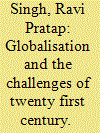

|
|
|
| 8 |
ID:
006132
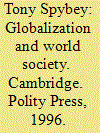

|
|
|
|
|
| Publication |
Cambridge, Polity Press, 1996.
|
| Description |
xiv,187p.,tables
|
| Standard Number |
0745611591
|
|
|
|
|
|
|
|
|
|
|
|
Copies: C:1/I:0,R:0,Q:0
Circulation
| Accession# | Call# | Current Location | Status | Policy | Location |
| 037811 | 301/SPY 037811 | Main | On Shelf | General | |
|
|
|
|
| 9 |
ID:
074501
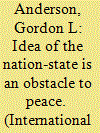

|
|
|
| 10 |
ID:
073615
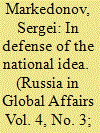

|
|
|
|
|
| Publication |
2006.
|
| Summary/Abstract |
The formation of Russia's new national policy is taking place amidst the broadening global crisis concerning the concept of the nation-state, which is instigated by the confrontation between globalization and ethnic separatism. Russia has a unique opportunity to reconsider and reformulate particular values of the nation-state.
|
|
|
|
|
|
|
|
|
|
|
|
|
|
|
|
| 11 |
ID:
074884
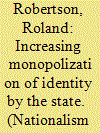

|
|
|
|
|
| Publication |
2006.
|
| Summary/Abstract |
The increasing monopolization by the nation-state of personal identity is a neglected feature of contemporary societies. First, there has occurred a somewhat puzzling conjunction between the activities of the state, on the one hand, and the flourishing of intellectual concern with the issue of identity, on the other. Second, it is a prominent feature of current processes of globalization that nation-states have been squeezed together, constraining them to announce their identities in order to highlight uniqueness. A central focus is upon the authoritarian, probably totalitarian, tendencies in the modern world, in spite of the present emphasis upon global democratization.
|
|
|
|
|
|
|
|
|
|
|
|
|
|
|
|
| 12 |
ID:
101760
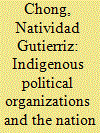

|
|
|
|
|
| Publication |
2010.
|
| Summary/Abstract |
The growing visibility of indigenous political organizations and activism in Latin America has a variety of claims and methods to interrelate with the state and organized civil society. These claims are framed within the logic of development and state construction; thus, these political projects fueled by ethnic actors do not have a secessionist outlook. This article addresses the different types of ethnic conflict current in Latin America. It also discusses the practical experience of implementing rights of autonomy. By highlighting the frequent types of ethnic conflict and their prevalence, the author looks forward to proposing a comparative model to explain the different routes taken by the construction of an inclusive, plurinational state led by ethnic actors. The article derives its analysis from the data bank of indigenous organizations, ORGINDAL.
|
|
|
|
|
|
|
|
|
|
|
|
|
|
|
|
| 13 |
ID:
082052
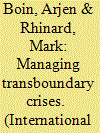

|
|
|
|
|
| Publication |
2008.
|
| Summary/Abstract |
The nation-state faces an increasing number of what we refer to as "transboundary threats." A transboundary threat is characterized by the potential to cross geographical and functional boundaries. These characteristics outstrip the capacity of nation-states and national bureaucracies that were designed to deal with more classic threats. The institutional challenge, we argue, is to build effective transboundary systems for managing these complex threats. In this essay, we ask what role the European Union can play in such an endeavor. We document the EU's growing crisis management and security capacities and offer an initial assessment of these capacities. We surmise that the EU will play a significant but rather circumscribed role, one which reflects the EU's unique system of supranational governance
|
|
|
|
|
|
|
|
|
|
|
|
|
|
|
|
| 14 |
ID:
172961
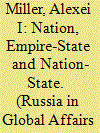

|
|
|
| 15 |
ID:
006074
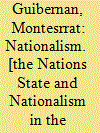

|
|
|
|
|
| Publication |
Cambridge, Polity Press, 1996.
|
| Description |
vi, 174p.
|
| Standard Number |
0745614027
|
|
|
|
|
|
|
|
|
|
|
|
Copies: C:1/I:0,R:0,Q:0
Circulation
| Accession# | Call# | Current Location | Status | Policy | Location |
| 037714 | 320.54/GUI 037714 | Main | On Shelf | General | |
|
|
|
|
| 16 |
ID:
167530
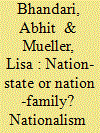

|
|
|
|
|
| Summary/Abstract |
Scholars have long puzzled over strong nationalism in weak African states. Existing theories suggest that (a) incumbent leaders use nationalistic appeals to distract people from state weakness; or (b) citizens use nationalistic claims to exclude rival groups from accessing patronage and public goods. But what explains robust nationalism in places where politicians seldom visit and where the state under-provides resources, as is true across much of Africa? We propose a theory of familial nationalism, arguing that people profess attachment to a nation-family instead of to a nation-state under conditions where the family, and not the state, is the main lifeline. We substantiate it using surveys from the border between Niger and Burkina Faso, where an international court ruling allowed people to choose their citizenship, thus providing a test for nationalism in marginalised communities. We supplement the border data with surveys and focus groups from the capitals of both countries.
|
|
|
|
|
|
|
|
|
|
|
|
|
|
|
|
| 17 |
ID:
051826
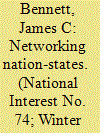

|
|
|
|
|
| Publication |
Winter 2003-04.
|
|
|
|
|
|
|
|
|
|
|
|
|
|
|
|
| 18 |
ID:
180229
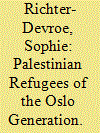

|
|
|
|
|
| Summary/Abstract |
This article analyzes the political narratives and critiques of young Palestinian refugees who have grown up in the bleak post-Oslo period. Based on ethnographic fieldwork and interviews conducted with refugee youth in Jordan and the West Bank between 2009 and 2014, I show that this generation of refugees endorses a collective Palestinian identity and peoplehood with claims to the (home)land while also narrating their identities and relations to land, nation, state, and rights as complex, multifaceted, and fractured. Their political imaginaries do not limit the political and epistemic project of decolonizing Palestine to the classic paradigm of a territorialized nation-state as enshrined in the Oslo two-state agenda. Rather, they point to a creative and radical, post-nation-statist, translocal politics for Palestine.
|
|
|
|
|
|
|
|
|
|
|
|
|
|
|
|
| 19 |
ID:
167172
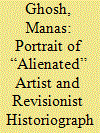

|
|
|
|
|
| Summary/Abstract |
East-Asian auteur cinema since 1980s, acclaimed in the global art cinema circuit, has critically examined the idea of the nation-state and cultural identity. In order to put forward the critical discourses of postcoloniality, the East-Asian cinema from the PRC, Taiwan, and South Korea has framed a dialectical relationship between history (of the official version) and memory (of personal experiences). It is interesting to note that the auteur cinema of PRC, Taiwan, and South Korea, which has investigated the relationship between history and memory, often placed the biographical and mythical stories of artists’ lived experiences, which have been marginalized in the official accounts of history, at the center of their narratives. This article aims to discuss how the postcolonial and post-Cold War re-imagination and re-figuration of the national culture in the auteur cinema of the PRC, Taiwan, and South Korea found embodiment in the portrait of artists.
|
|
|
|
|
|
|
|
|
|
|
|
|
|
|
|
| 20 |
ID:
174167
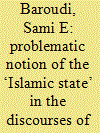

|
|
|
|
|
| Summary/Abstract |
This article examines the conceptualization of the 'Islamic state' by one reputable Arab Islamist scholar, Muhammad Abu Zahra. It contends that he fails to provide internally consistent answers to four key questions. First, does the Islamic state presently exist, or is it yet to be established; and if the latter is the case then by whom and how? Second, was the historic caliphate which allegedly extended from the death of the Prophet until the Ottoman caliphate’s dissolution an 'Islamic state'? Third, is the 'Islamic state' universal in scope, or can there be several Islamic states at the same time? Fourth, what is the relationship between the 'Islamic state' and Islamic unity; and can the latter be achieved outside the context of the 'Islamic state'? I argue that Abu Zahra’s conceptualization of the 'Islamic state' is heavily influenced by 'modern'/European ideas about the nation-state; as a sovereign entity with the authority to impose its writ over its citizens and territory. I conclude that the 'Islamic state' is a stillborn idea being a hybrid of two highly incompatible sets of genes: the Islamic tradition, which does not conceive the Umma in territorial terms, and the 'modern'/ European notion of the territorial state.
|
|
|
|
|
|
|
|
|
|
|
|
|
|
|
|
|
|
|
|
|